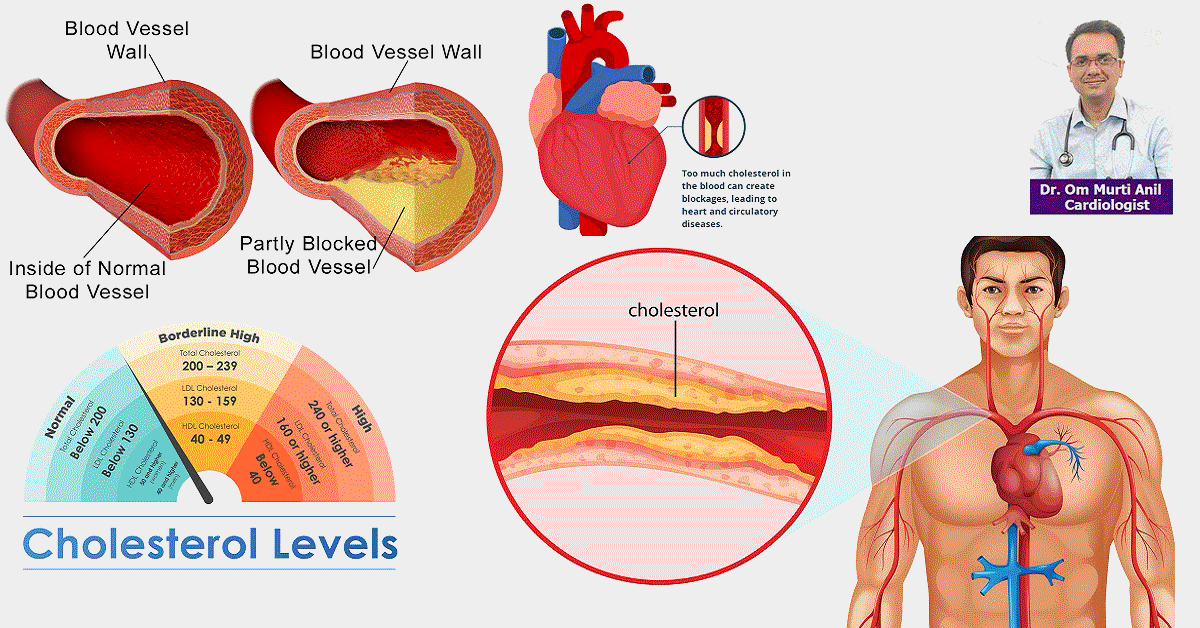
Learn details expert advice of high cholesterol, symptoms of high cholesterol, high cholesterol treatment, causes high triglycerides and high triglycerides symptoms. Senior Cardiologist Dr. Om Murti Anil suggested the following tips for a healthy lifestyle.
Cholesterol is a type of fat found in the blood, which is obtained from food. When the fat in the food is absorbed in the intestines, it reaches the blood. If the level of bad cholesterol in the blood (LDL) is high, it is likely to stick to the walls of blood vessels. This process is ongoing in every person.
The higher the cholesterol and the higher the duration, the greater the risk of blood vessel blockage. Unknowingly, even young people who look healthy on the outside may have high cholesterol narrowing their blood vessels.
Cholesterol build-up in the coronary and cerebral arteries, which affects the heart and brain, can be the first sign of high cholesterol.
High cholesterol is the leading cause of heart attack in young people. Young people with high cholesterol-triglycerides may not have any symptoms. This can cause sudden problems in a healthy person. So people over the age of 20 need to know their cholesterol levels by testing their blood in time.
Cholesterol Testing
A test to find out the amount of cholesterol in the blood is called a lipid profile. This requires an empty stomach for 8 to 12 hours. The level of LDL in the blood should be less than 100 mg percent. Similarly, triglyceride should be less than 150 ml.
Under what conditions should the medicine be started?
The decision to start a medication depends on a number of factors. Cholesterol levels alone do not always make the decision to take medication. Cholesterol levels also depend on the risk of heart disease, stroke, and other diseases.
If you have diabetes, high blood pressure, obesity, smoking and alcohol consumption, hereditary, heart disease, etc., such patients often have to decide the drug based on the amount of cholesterol. It is up to the doctor to decide. Because it has ample evidence to prevent heart attacks and strokes.
Therefore, medical science has shown that even if you have a little more cholesterol, you should give medicine. If high cholesterol is seen, the risk of cholesterol can be reduced by initially taking medication and controlling it, and changing the lifestyle diet to Bihar.
Cholesterol medication should be taken regularly for a long time on the advice of a doctor. You should not eat and leave as you wish. This can lead to fluctuations in cholesterol levels.
Treatment process:
The key to controlling cholesterol is a balanced diet. Cholesterol-lowering drugs reduce the risk of heart attack and stroke. Medications should be used to lower cholesterol levels and bring them back to normal.
Later, by changing your lifestyle and improving your eating habits, you can reduce the amount of medicine and stop. But patients with diabetes and heart attack should take the medicine regularly. Such patients may sometimes need to take medication for normal cholesterol. Alcohol consumption can also increase triglycerides.
There is a belief that drinking less alcohol has health benefits, but this is not entirely true. Beer raises triglycerides. Drinking small amounts of wine can increase good cholesterol. However, the idea that alcohol is good for the heart has been scientifically proven wrong.
Weight loss will be followed by fatigue and constant tiredness. For this, you have to walk, exercise, and pay attention to eating and drinking every day. Walking lowers bad cholesterol levels and raises good cholesterol levels. People with high cholesterol and triglycerides are at risk of fatal diseases, so it is important to control their levels as soon as possible.
Initially, according to the doctor's advice, by taking medicine, then by eating and drinking, and by improving the lifestyle, it can be controlled forever without medicine. Since there are no symptoms, it is important to check the lipid profile in time.
(Author: Dr. Om Murti Anil is a senior cardiologist, associated with National Cardiac Center)
Disclaimer: This article provides general information and discussions about Cholesterol and related subjects. You should consult with your health care provider or seek other professional medical treatment.


